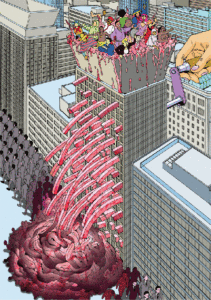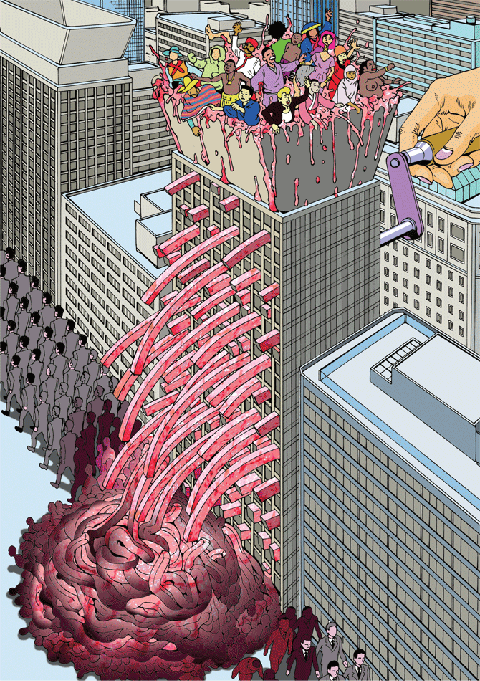I was recently reviewing an older Club Orlov article titled: Understanding Organizational Stupidity.
In the article, Orlov attempts to answer the question “Why Are We Being So Fucking Stupid?”
He is speaking about stupidity regarding American Economic policy, but I see the same problems in the way most police organizations function. I know a lot of cops are asking “Why are we being so fucking stupid?” on a daily basis as they look at their agency operating policies.
Read some of the quotes in the article:
“…In hierarchical organizations structured around a chain of command, intelligence is subtractive. The lowest grunts or peons are expected to carry out orders unquestioningly. Their critical faculties are 100% impaired; if not, they are subjected to disciplinary action. The supreme chief executive officer may be of moderately impaired intelligence, since it is indicative of a significant character flaw to want such a job in the first place. (Kurt Vonnegut put it best: “Only nut cases want to be president.”) But beyond that, the supreme leader must act in such a way as to keep the grunts and peons in line, resulting in further intellectual impairment, which is compounded across all of the intervening ranks, with each link in the chain of command contributing a bit of its own stupidity to the organizational stupidity stack.”
Hmmm…that sounds familiar to the average street cop.
Orlov goes on to describe “functional stupidity.”
“Functional stupidity is organizationally-supported lack of reflexivity, substantive reasoning, and justification (my italics). It entails a refusal to use intellectual resources outside a narrow and “safe” terrain. It can provide a sense of certainty that allows organizations to function smoothly. This can save the organization and its members from the frictions provoked by doubt and reflection. Functional stupidity contributes to maintaining and strengthening organizational order. It can also motivate people, help them to cultivate their careers, and subordinate them to socially acceptable forms of management and leadership. Such positive outcomes can further reinforce functional stupidity.”
“Functional stupidity is self-reinforcing. Stupidity self-management, reinforced using the four managerial techniques listed above, produces a fragile, blinkered sort of certainty. By refusing to look in certain directions, people are able to pretend that what is there does not exist. But reality tends to intrude on their field of perception sooner or later, and then the reaction is to retreat into functional stupidity even further: those who can ignore reality the longest are rewarded and promoted, setting an example for others.”
Orlov defines and comments on the words in bold text above.
“Reflexivity refers to the ability and willingness to question rules, routines and norms rather than follow them unquestioningly. Is your corporation acting morally?”
Cops who question rules are quickly ostracized. Very few police administrators are asking any questions to ascertain if the organization is acting morally. To ask those questions would shatter the status quo, the very system that resulted in the promotion of the administrator.
“Justification refers to the ability and willingness to offer reasons and explanations for one’s own actions, and to assess the sincerity, legitimacy, and truthfulness of reasons and explanations offered by others.”
I think most cops will recognize that the justification for most organizational procedures and decisions comes down to “we’ve always done it this way” rather than any true objective analysis of problems and their solutions. Questioning “the way it has always been done” gets you back to the “reflexivity” problem I mentioned above.
“Substantive reasoning refers to the ability and willingness to go beyond the “small set of concerns that are defined by a specific organizational, professional, or work logic.” For example, economists tend to compress a wide range of phenomena into a few numbers, not bothering to think what these numbers actually represent. Organizational and professional settings discourage people from straying from the confines of their specializations and job descriptions, in essence reducing their cognitive abilities to those of idiot-savants.”
This is one of the biggest problems in police work. Cops want to do “cop stuff.” Cops arrest bad guys, write tickets, and help people in distress. The daily job action of a police officer is the very definition of dealing with a “small set of concerns that are defined by a specific organizational, professional, or work logic.”
No one is asking the big questions. No one is effectively working to change big things in a big way. Everyone tallies up their tickets, arrests, and reports to show “work product.” Cops are rewarded and promoted when their “numbers” are good. The problem is that when officers are focused on “numbers,” they aren’t focusing on solving the major problems in their community. A lot of the major issues that cops can actually affect cannot be measured by ticket and arrest statistics.
It isn’t the fact that the police have rifles and armored vehicles that cause problems with the populace. The primary issues of complaint aren’t caused by poor race relations, police militarization, or ineffective “de-escalation tactics.”
Nope. The core of the issue with current police/community relations problems is this functional and organizational stupidity that Orlov speaks about.
Every police department I’ve ever worked with has displayed elements of being “functionally stupid.” And none of them are doing anything productive in order to get organizationally smarter.



